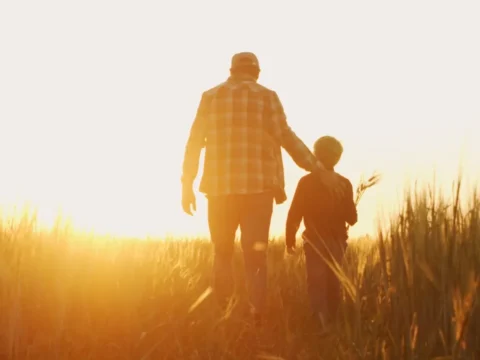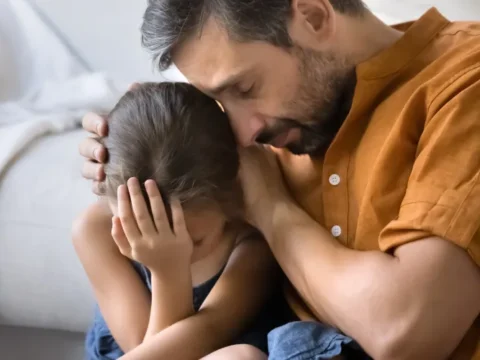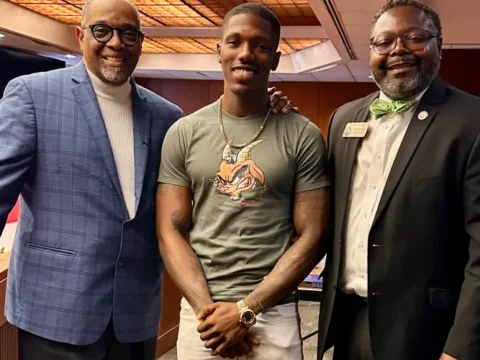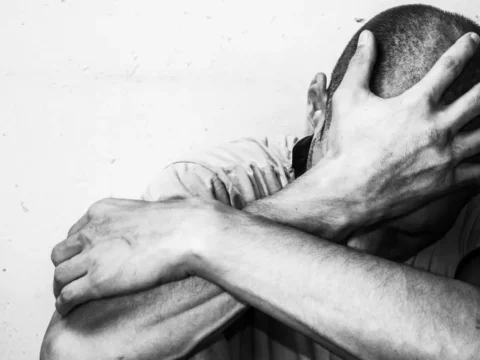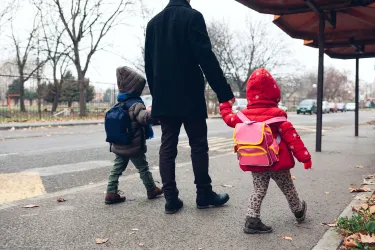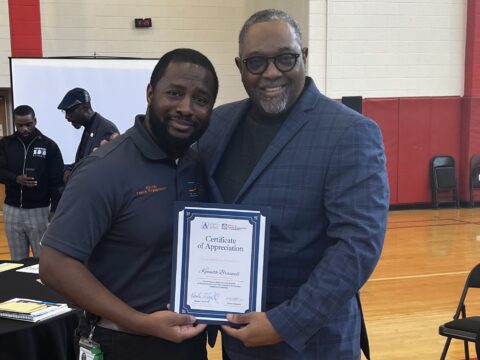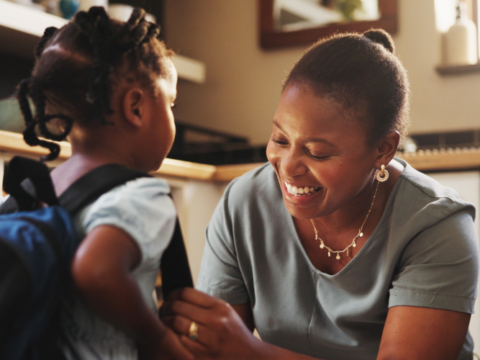By Kenneth Braswell, CEO, Fathers Incorporated
There are moments in this work that stop you cold and remind you that success in fatherhood is not always wrapped in ribbons and applause. One of those moments came recently, when I received news about one of our fathers — a man who had come through our Gentle Warriors Academy (GWA) and completed all of his classes. He was proud, determined, and ready to graduate, but he had one additional obligation to fulfill.
He had to turn himself in.
He had to fulfill a responsibility connected to a past mistake, an echo that followed him even as he tried to step forward, and I found myself sitting with the complicated truth that sometimes, in this work, wins are born inside losses. Sometimes, progress doesn’t look like freedom, and redemption begins behind walls.
This father did everything right in the program. He showed up. He learned. He grew. He held himself accountable. But accountability doesn’t erase history. It just reframes it. And in his reframing, he did something powerful: He chose responsibility over avoidance. He chose to walk into a hard situation so that his future relationship with his child could be built on truth, not evasion.
That, to me, is a win, but try explaining that to the world, especially a world obsessed with scoreboards.
The Win-Loss Illusion in Parenting
Parenthood, in general (and fatherhood, in particular), is often talked about in the language of winning and losing. We hear it in courtrooms: “I won custody.” We hear it in child support battles: “He lost his rights.” We even hear it in the tone of everyday conversations when someone asks, “What happened with your case?” and the answer comes back, “I won.”
But every time a parent “loses” in court, there is another loss that no one writes about — the child’s. The child loses the rhythm of consistent connection. They lose the security of shared presence. And they begin to internalize the idea that love and belonging are things people have to compete for.
The deeper I’ve gotten into this work, the more I’ve seen how our systems—legal, social, and cultural—turn parenthood into a zero-sum game. But parenthood was never meant to have a scoreboard. When one parent “wins” at the other’s expense, the family loses balance. The child loses stability. And even the “winner” eventually realizes that victory feels hollow when it comes at the cost of peace.
The Difficult Math of Fatherhood
At Fathers Incorporated (FI), we serve hundreds of fathers every year through GWA and related programs. Over the last five years, we’ve connected with more than 1,100 fathers. Of those, 885 have graduated — a 71 percent graduation rate.
On paper, that’s a strong number. That’s a win.
But there’s another number we can’t ignore: the 29 percent who didn’t finish. The 29 percent who started but couldn’t cross the finish line. The 29 percent whose stories remind us that progress isn’t always linear and that percentage points can hide pain, setbacks, and unfinished growth.
That 29 percent is a heavy loss, not because it diminishes our success, but because it keeps us honest about what winning really means. It reminds us that the journey toward better fatherhood is as much about what we recover as what we achieve.
Redefining the Win in Fatherhood
When I think back to that father who turned himself in, I can’t help but think about how easy it would be to call his story a loss. He lost time with his family. He will spend months, or maybe years, away from his child, but look deeper.
He faced his past so his child could have a future with a father who tells the truth. By taking ownership of his mistakes, he taught his child that real strength is about accountability, not escape.
That’s the kind of win we don’t celebrate enough.
Too often, we think of fatherhood victories as moments of visible achievement — graduations, jobs, reconciliations, and legal victories. But fatherhood is just as much about the quiet wins: the call made from a distance, the letter sent from confinement, the FaceTime that bridges the miles, every “I love you” spoken out loud.
These are the victories that build emotional continuity — the threads that keep fathers and children connected even when life pulls them apart.
When Family Law Becomes the Loss
One of the most painful truths in this work is how the word “loss” itself shapes the emotional reality of fathers. When a father “loses” in court — custody, visitation, or a child support ruling — it’s more than a loss on paperwork. It’s also identity. It’s value. It’s the world telling him he’s less than, and often that message outlasts the legal ruling.
For mothers, too, these systems create impossible tension — navigating love and legality while trying to preserve peace. The courtroom becomes a battlefield, and the child becomes collateral.
Our challenge as a society is to reimagine what it means to “win” in family court. Winning should mean connection, not control. It should mean both parents have pathways to contribute to the child’s well-being. It should mean stability, cooperation, and peace — not resentment, division, or silence.
Until our systems, laws, policies, and cultural narratives reflect that, we will continue to pass down victories that feel like losses and celebrate outcomes that don’t heal families.
Fatherhood Program Outputs vs. Outcomes
In the nonprofit world, we are often measured by outputs: how many dads we serve, how many workshops we host, how many hours of curriculum participants complete. These numbers matter, but they are not the full picture.
The true measure of fatherhood work is outcomes. Did we help a father rebuild trust with his child? Did we give him tools to co-parent more peacefully? Did his participation in our program reduce conflict in his home or increase consistency in his child’s life?
These successes don’t fit neatly into a spreadsheet, but they actually change lives.
When we shift from outputs to outcomes, we stop asking “How many?” and start asking “How well?” We stop focusing solely on what fathers complete and begin focusing on what they become.
The Real Battle for Families: Connection vs. Contention
Every day, fathers walk into our programs carrying invisible scorecards. Some tally their failures; others measure themselves against what society says a “good father” should look like. Too often, they enter with heads low, weighed down by labels (absent, unfit, irresponsible), when the truth is that most of them are just trying to fight their way back into connection.
The real battle in fatherhood isn’t against another parent. It isn’t against the court system. It isn’t even against circumstance. The real battle is against disconnection — the slow erosion of presence that happens when shame, fear, or policy convince a father that he no longer matters.
But presence doesn’t always have to mean proximity. Even from behind bars, through distance, or in the silences of complicated situations, a father can still show up emotionally, spiritually, and intentionally. He can still be a voice in his child’s life that says, I see you. I love you. I’m still here.
That’s the message we want every father to carry, especially those who feel like they’ve already lost.
The Unseen Winners
For every father who makes it to graduation, there’s a team of people behind him — case managers, program facilitators, peers, and family — helping him fight through the fog of doubt and delay. For every graduation photo, there are stories we never see. The nights of questioning. The court dates. The relationships being repaired.
And then there are those fathers who don’t make it to the cap and gown but make it to something greater: understanding. They realize that being a father isn’t about perfection but persistence, that even when they stumble, the journey doesn’t end.
These are the unseen winners of fatherhood — the ones who keep fighting, even when the scoreboard says they’re down.
Rewriting the Rules for Families and Fathers
If we are going to create a culture that truly supports families, we must stop using the language of competition and start using the language of collaboration.
Winning should no longer mean “having more rights.” It should mean “sharing more responsibility.” Losing should no longer mean “being excluded.” It should mean “having room to grow.”
And when the law, culture, and systems fail to see that, it becomes our job — as organizations, advocates, and communities — to redefine success on our own terms.
That is what we strive to do every day at FI.
We don’t just want fathers to win custody battles; we want them to win connection. We don’t just want them to complete programs; we want them to complete transformations. We don’t just want them to be present in photos; we want them to be present in purpose.
The Lesson in the Loss
When that father (our recent graduate) walked into jail, he didn’t walk away from his role as a dad but toward his redemption. His absence is temporary, but his commitment is lasting. His child will one day know that their father chose integrity over avoidance, and in that knowing, there will be healing.
That’s what I’ve learned after nearly two decades in this field: Sometimes the greatest lessons in fatherhood come disguised as losses. The path to presence runs through pain. Sometimes, you have to sit with what feels like defeat to discover what real victory looks like.
And when we understand that, when we measure success not by status but by sincerity, we begin to change not just fathers, but families, and in turn, the future.


